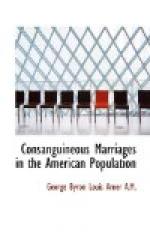It is thus possible to account for the large proportion of deafness among persons of consanguineous parentage by the simple action of the laws of heredity. Why then should we go out of our way to look for a cause of the defect in consanguinity itself? When two explanations are possible, the simpler explanation is the more probable, other factors being equal; but in the present problem the factors are not equal, for the evidence points strongly toward the simpler hypothesis of intensified heredity, while there is little or no evidence that consanguinity is a cause per se.
As to the probability then of a consanguineous marriage producing deaf offspring, it will readily be seen to be very slight, and in those cases where there is actually no trace of hereditary deafness in the family, perhaps no greater than in non-related marriages. While the census figures in regard to the deaf are not complete they probably include a great majority of the deaf in the United States. The 89,287 deaf would mean an average of 12 deaf persons to every 10,000 inhabitants and the 14,472 congenitally deaf, 2 persons to every 10,000. Assuming then, as before[93] that 1,000,000 persons in continental United States are the offspring of consanguineous marriages within the limits of the term “cousins” as used in the Census report, 41 out of every 10,000 persons of consanguineous parentage would be deaf, and 17 congenitally so. Thus less than one half of one per cent of the offspring of consanguineous marriages in the United States are deaf, and only one sixth of one per cent are deaf-mutes in the commonly accepted sense of the term.
[Footnote 93: Supra, p. 64.]
It is interesting here to quote an opinion given by Dr. Bell in 1891, as to the probable results of the consanguineous marriage of deaf persons.[94]
[Footnote 94: Marriage—An Address to the Deaf, second edition, Appendix.]
1. A deaf person, not
born deaf, who has no deaf relatives,
will probably not increase
his liability to have deaf offspring
by marrying a blood relative.
2. A deaf person, born
deaf, who has no deaf relatives, will
probably increase his liability
to have deaf offspring by
marrying a blood relative.
3. A deaf person, whether born deaf or not, who has deaf relatives, will probably increase his liability to have deaf offspring by marrying a blood relative, especially if that relative should happen to be on the deaf side of the family. For example: If his father has deaf relatives and his mother has none, he will be more likely to have deaf offspring if he marries a relative of his father than if he marries a relative of his mother.
The laws of heredity seem to indicate that a consanguineous marriage increases or intensifies in the offspring whatever peculiarities exist in the family. If a family is characterized




